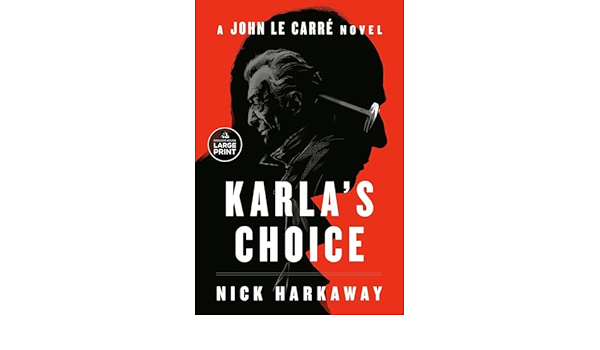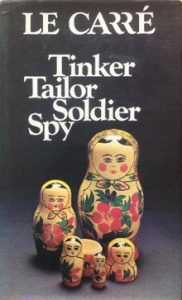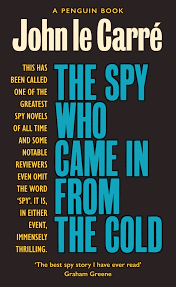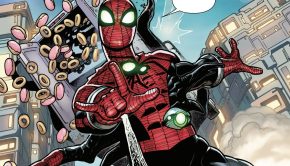Book Review – Karla’s Choice: Karla’s Choice: A John Le Carré Novel
Karla’s Choice, written by Nicholas Cornwell, writing as Nick Harkaway. Published 24/10/2024 by Penguin Books.
Pastiche (noun): an artistic work in a style that imitates that of another work, artist, or period.
Fans of Conan and Robert E Howard in general understand that pastiche writing can go badly wrong. Capitalising on the fantasy boom created by the release of the Lord of the Rings in America in the 1960s, it quickly became obvious there was a huge market for genre fiction. Howard was long dead, but his character proved irresistible to a merry band of writers who, with permission of the estate, launched into a long running series of books that furthered the adventures of everyone’s favourite barbarian. But my God, the quality was variable to say the least.
Of course, latterly, we have writers take up the work of their long dead predecessors. HG Wells’s The War of the Worlds got the sequel treatment thanks to noted science fiction writer Stephen Baxter. William Meikle obtained permission to write a sequel to Conan Doyle’s The Lost World. Brandon Sanderson took up the pen of deceased writer Robert Jordan to complete his Wheel of Time sequence. During the 1980s, you couldn’t walk into a bookstore without a James Bond novel, written with permission of the Fleming Estate, launching itself at you. Pastiche upon pastiche upon pastiche. Some good, some very, very bad indeed.
Which is all a long way of saying – what is Karla’s Choice like? Does author Nick Harkaway (pseudonym of author Nicholas Cornwell) do credit to the supposedly inimitable creation of his father David Cornwell, (or rather, John Le Carre) George Smiley?
To avoid answering that right now, I have to advise that I went back and read The Spy Who Came in From the Cold. While it was Le Carre’s third published novel, it was this landmark work that established him in the front rank of spy thriller writers, and perhaps, just plain old literature. Eschewing the misogyny, sexism and racism that marks Fleming’s writing, Le Carre created a more nuanced depiction of espionage, with amoral spymasters using their people as chessmasters use pieces on the board – playing the long game, willing to sacrifice pawns in furtherance of a long delayed goal, and a general murky attitude to morality.
Le Carre coupled that with a writing style that was allusive, and elusive, happily leading the reader down the primrose path until, as if by chance (as if) the characters found themselves dancing on the edge of a precipice, and often, beyond. There is a psychological depth and realism to the characters that are all too absent in most previous works of espionage fiction.
Le Carre is willing to play fast and loose with the expectations of the audience. In The Spy Who Came in From the Cold, Alec Leamas (his character’s fate hangs over Karla’s Choice like a shroud) is a man using and deceiving those around him in furtherance of his mission but is himself unaware he is himself is being used and deceived by those in positions of power. The book is an icy, grim experience, were despair and self-hatred feature heavily. Leamas hates what he does, but sees no other way out other than to engage in one final job to save the life of a man who himself is abhorrent. As an aside, readers are urged to hunt down the movie adaptation starring Richard Burton – it is a masterpiece, and a great corrective to the flashier Bond movies of that era.
So, then, is Karla’s Choice, set between The Spy Who Came in From the Cold and Le Carre’s other masterpiece, Tinker, Tailor, Soldier, Spy, a worthy continuation of the world of the Cambridge Circus and Moscow Centre his father created. Unambiguously, yes.
True, the writing styles, while similar, are not exact. But Harkaway’s tale of the search for a vanished Hungarian emigree, with Soviet intrigue looming ominously in the background, is stylistically, a beautifully written and intriguing novel. And just as Robert Howard’s followers grasped for and failed again and again to match his masterful characterisation, so too we would be expecting too much of Harkaway to exactly parrot his father’s style.
But Harkaway goes to considerable effort to mirror his father’s approach of giving his characters psychological depth and moral ambiguity, which is to this novel’s very great benefit. In a world of shallow delights, it is gratifying to read a book that cares not only about its characters, but also those sitting down to read the novel.
In short, Karla’s Choice is a resounding success – a well written, gripping story of betrayal, abuse, dashed hopes and ambiguous victory. Not only is it a pleasure to welcome back Smiley, a grey (before his time) eminence, but it is also pleasing to dwell within the superbly evoked 1960s setting.
I would hope that the publisher’s retain Harkaway, if they intend to continue the story of Smiley and the people populating the Circus. He has his father’s touch, but also brings something of himself as well. A novel well worth seeking out.









